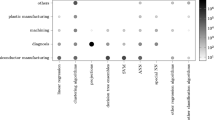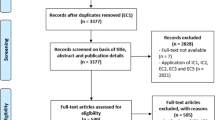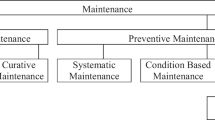Abstract
This paper proposes a multi-objective integrated optimization model of production scheduling and machine maintenance to find the optimal production sequence and preventive maintenance (PM) decisions. This model considers the setup time, the learning-forgetting effects and the multi-degradation effects. The setup time and the learning-forgetting effects are associated with jobs' similarities and PM decisions. The multi-degradation effects including machine deterioration, failure rate and quality characteristic loss determine the stochastic nature of the objectives. A hybrid maintenance strategy combining imperfect PM and minimal repair (MR) is adopted to effectively reduce the failure frequency and improve the processing quality. Then, the multi-objective solution is simplified by normalizing cost, time and utilization. The local search and the elitism strategy are conducted to avoid the solutions falling into local optimum and losing the best chromosome during evolutions. Finally, a case study of automobile engine manufacturing shows that our proposed model can reduce the total maintenance costs by 27%, shorten the total processing time by 3%, as well as improve the machine utilization by 3%.













Similar content being viewed by others
Abbreviations
- \(G_{i}\) :
-
\(i{th}\) Group (\(i \in \{ 1,2,...,h\}\)), where \(h\) is the total number of groups
- \(n_{i}\) :
-
Number of job types in \(G_{i}\)
- \(J_{i,j}\) :
-
\(j{th}\) Job type in \(G_{i}\), where \(j \in \{ 1,2, \ldots ,n_{i} \}\)
- \(q_{i,j}\) :
-
Production batch of \(J_{i,j}\)
- \(L_{PM}\) :
-
Machine processing quality characteristic loss threshold
- \(\upsilon\),\(\tau\) :
-
Degradation coefficients of processing quality characteristic distribution
- \(l(x)\) :
-
Machine processing quality characteristic loss function
- \(L(x(t))\) :
-
Machine processing quality characteristic loss at runtime t
- \(C_{L}\) :
-
Scraping loss
- \(C_{U}\) :
-
Reworking loss
- \(k_{1}\),\(k_{2}\) :
-
Processing quality characteristic loss coefficient which bias toward scrapping and reworking
- \(\lambda_{PM}\) :
-
Failure rate threshold
- \(\beta\),\(\theta\) :
-
Shape parameter and size parameter of failure rate function
- \(\lambda^{ - }\), \(\lambda^{ + }\) :
-
Machine failure rate before and after PM
- \(\gamma_{0}\), \(\gamma_{1}\) :
-
Constants related to the difficulty of PM
- \(T_{{pm_{{_{i,j} }} }}\) :
-
Time of PM before processing \(J_{i,j}\)
- \(c\) :
-
PM cost per unit time
- \(C_{{pm_{{_{i,j} }} }}\) :
-
Cost of PM before processing \(J_{i,j}\)
- \(a_{i,j}^{ - }\), \(a_{{_{i,j} }}^{ + }\) :
-
Machine's age before and after processing \(J_{i,j}\)
- \(t_{mr}\), \(c_{mr}\) :
-
Time and cost of MR
- \(n_{{mr_{i,j} }}\) :
-
Expected times of MR while processing \(J_{i,j}\)
- \(T_{{mr_{{_{i,j} }} }}\), \(C_{{mr_{{_{i,j} }} }}\) :
-
Expected time and cost of MR while processing \(J_{i,j}\)
- \(t_{i,j}\) :
-
Standard processing time of \(J_{i,j}\)
- \(s\), \(F\) :
-
Basic setup time of jobs in same group and between groups
- \(s_{i,j}^{i}\) :
-
Actual setup time between \(J_{i,j}\) and \(J_{i,j + 1}\)
- \(F_{i,i + 1}\) :
-
Actual setup time between \(G_{i}\) and \(G_{i + 1}\)
- \(r_{j,k}^{i}\) :
-
Similarity between \(J_{i,j}\) and \(J_{i,k}\)
- \(r_{i,l}\) :
-
Similarity between \(G_{i}\) and \(G_{l}\)
- \(p_{i,j,g}\) :
-
Processing time of the \(g^{th}\) job of \(J_{i,j}\), where \(g \in \{ 1,2,...,q_{ij} \}\)
- \(\varepsilon\) :
-
Fixed learning rate
- \(p_{{_{i,j} }}^{ * }\) :
-
Processing time of \(J_{i,j}\) considering learning-forgetting effects
- \(p_{i,j}\) :
-
Three-effect based processing time of \(J_{i,j}\)
- \(f(r_{j - 1,j}^{i} ,s_{j - 1,j}^{i} )\) :
-
Forgetting rate between jobs in same group
- \(\varphi\) :
-
Forgetting coefficient between jobs in same group
- \(f^{^{\prime}} (r_{i - 1,i}^{G} ,F_{i - 1,i} )\) :
-
Forgetting rate between different groups
- \(\phi\) :
-
Forgetting coefficient between different groups
- \(\alpha_{k}\) :
-
Deteriorating factor
- \(\partial\) :
-
Deteriorating weight
- \(a^{*}\) :
-
Machine's age when the failure rate reaches the threshold
- \(a_{0}\) :
-
Machine's initial age
- \(F_{0}\) :
-
Setup time for \(G_{{1}}\)
- \(E\left( {T_{i,j} } \right)\) :
-
Expected completion time of \(J_{i,j}\)
- \(E\left( {C_{i,j} } \right)\) :
-
Expected total cost after processing \(J_{i,j}\)
- \(R\) :
-
Machine utilization
- \(T_{min}\), \(T_{max}\) :
-
Minimum and maximum completion time of all feasible solutions
- \(C_{min}\), \(C_{max}\) :
-
Minimum and maximum total maintenance cost of all feasible solutions
- \(R_{min}\), \(R_{max}\) :
-
Minimum and maximum machine utilization of all feasible solutions
- \(\omega_{t}\), \(\omega_{c}\), \(\omega_{r}\) :
-
Weight of completion time, maintenance cost and machine utilization
References
Adhikary D, Bose G, Jana D, Bose D, Mitra S (2016) Availability and cost-centered preventive maintenance scheduling of continuous operating series systems using multi-objective genetic algorithm: A case study. Qual Eng 28(3):352–357
Aghezzaf E, Khatab A, Tam P (2016) Optimizing production and imperfect preventive maintenance planning’s integration in failure-prone manufacturing systems. Reliab Eng Syst Saf 145:190–198
Arizono I, Okada Y, Tomohiro R, Takemoto Y (2016) Rectifying inspection for acceptable quality loss limit based on variable repetitive group sampling plan. Int J Adv Manuf Technol 85(9):2413–2423
Assid M, Gharbi A, Dhouib K (2015) Joint production and subcontracting planning of unreliable multi-facility multi-product production systems. Omega 50:54–69
Bhuvana J, Aravindan C (2016) Stopping criteria for MAPLS-AW, a hybrid multi-objective evolutionary algorithm. Soft Comput 20(6):2409–2432
Biskup D (2008) A state-of-the-art review on scheduling with learning effects. Eur J Oper Res 188(2):315–329
Biskup D (1999) Single-machine scheduling with learning considerations. Eur J Oper Res 115(1):173–178
Bouslah B, Gharbi A, Pellerin R (2016) Integrated production, sampling quality control and maintenance of deteriorating production systems with AOQL constraint. Omega 61:110–126
Cao W, Yan C, Guo F (2015) CNC gear hobbling automatic programming based on group technology and standard template. Comput Integr Manuf Syst 21(1):195–203
Chan W, Hu H (2001) An application of genetic algorithms to precast production scheduling. Comput Struct 79(17):1605–1616
Chansombat S, Pongcharoen P, Hicks C (2018) A mixed-integer linear programming model for integrated production and preventive maintenance scheduling in the capital goods industry. Int J Prod Res 57(1):61–82
Chen X, An Y, Zhang Z, Li Y (2020) An approximate nondominated sorting genetic algorithm to integrate optimization of production scheduling and accurate maintenance based on reliability intervals. J Manuf Syst 54:227–241
Di Somma M, Yan B, Bianco N, Luh B, P, Graditi G, Mongibello L, Naso V, (2016) Multi-objective operation optimization of a Distributed Energy System for a large-scale utility customer. Appl Therm Eng 2(27):752–761
Dinh T, Yann D, Mitra F (2017) Analytical properties of an imperfect repair model and application in preventive maintenance scheduling. Eur J Oper Res 256(2):439–453
Feng H, Tan C, Xia T, Pan E, Xi L (2019) Joint optimization of preventive maintenance and flexible flowshop sequence-dependent group scheduling considering multiple setups. Eng Optimiz 51(9):1529–1546
Feng H, Xi L, Xiao L, Xia T, Pan E (2018) Imperfect Preventive Maintenance Optimization for Flexible Flowshop Manufacturing Cells Considering Sequence-dependent Group Scheduling. Reliab Eng Syst Saf 176:218–229
Fitouhi M, Nourelfath M (2014) Integrating noncyclical preventive maintenance scheduling and production planning for multi-state systems. Reliab Eng Syst Saf 121:175–186
Gan J, Zeng J (2014) Single-machine integrated scheduling model considering maintenance activities. Comput Integr Manuf Syst 20(5):1099–1105
Hu J, Jiang Z, Liao H (2017) Preventive maintenance of a batch production system under time-varying operational condition. Int J Prod Res 55(19–20):5681–5705
Khatab A (2018) Maintenance optimization in failure-prone systems under imperfect preventive maintenance. J Intell Manuf 29:707–717
Kim B, Ozturkoglu Y (2013) Scheduling a single machine with multiple preventive maintenance activities and position-based deteriorations using genetic algorithms. Int J Adv Manuf Technol 67(5):1127–1137
Kuo W, Yang D (2006) Single-machine group scheduling with a time-dependent learning effect. Comput Oper Res 33:2099–2112
Kuo W (2012) Single-machine group scheduling with time-dependent learning effect and position-based setup time learning effect. Ann Oper Res 196(1):349–359
Lee J, Kim Y (2012) Minimizing the number of tardy jobs in a single-machine scheduling problem with periodic maintenance. Comput Oper Res 39(9):2196–2205
Li X, Jiang Y, Ruiz R (2018) Methods for Scheduling Problems Considering Experience, Learning and Forgetting Effects. IEEE T Syst Man & Cybernetics Syst 48(5):743–754
Liao H, Elsayed E, Chan L (2006) Maintenance of continuously monitored degrading systems. Eur J Oper Res 175(2):821–835
Liao W, Pan E, Xi L (2010) Preventive maintenance scheduling for repairable system with deterioration. J Intell Manuf 21(6):875–884
Liao W, Zhang X, Jiang M (2017) Multi-objective group scheduling optimization integrated with preventive maintenance. Eng Optimiz 49(11):1890–1904
Liu F, Yang J, Lu Y (2019) Solution algorithms for single-machine group scheduling with ready times and deteriorating jobs. Eng Optimiz 51(5):862–874
Liu X, Wang W, Peng R (2015) An integrated production, inventory and preventive maintenance model for a multi-product production system. Reliab Eng Syst Saf 137:76–86
Maatouk I, Jarkass I, Chatelet E, Chebbo N (2019) Preventive Maintenance Optimization and Comparison of Genetic Algorithm Models in a Series-Parallel Multi-State System. J Intell Syst 28(2):219–230
Miyata HH, Nagano MS, Gupta JND (2019) Incorporating preventive maintenance into the m-machine no-wait flow-shop scheduling problem with total flow-time minimization: a computational study. Eng Optimiz 51(4):680–698
Mosheiov G (2001) Scheduling problems with a learning effect. Eur J Oper Res 132(3):687–693
Mosheiov G, Sidney J (2003) Scheduling with general job-dependent learning curves. Eur J Oper Res 147(3):665–670
Ouaret S, Kenné J, Gharbi A (2018) Production and replacement policies for a deteriorating manufacturing system under random demand and quality. Eur J Oper Res 264(2):623–636
Pacheco J, Porras S, Casado S, Baruque B (2018) Variable neighborhood search with memory for a single-machine scheduling problem with periodic maintenance and sequence-dependent set-up times. Knowledge-Based Syst 145:236–249
Pan E, Liao W, Xi L (2012) A joint model of production scheduling and predictive maintenance for minimizing job tardiness. Int J Adv Manuf Technol 60(9–12):1049–1061
Pan E, Wang G, Xi L, Chen L, Han X (2014) Single-machine group scheduling problem considering learning, forgetting effects and preventive maintenance. Int J Prod Res 52(19):5690–5704
Pandey D, Kulkarni M, Vrat P (2011) A methodology for joint optimization for maintenance planning, process quality and production scheduling. Comput Ind Eng 61(4):1098–1106
Paprocka I (2018) The model of maintenance planning and production scheduling for maximising robustness. Int J Prod Res 57(14):4480–4501
Pasha M, Moghadam M, Fani S, Khadem Y (2018) Effects of quality characteristic distributions on the integrated model of Taguchi’s loss function and economic statistical design of X-control charts by modifying the Banerjee and Rahim economic model. Commun in Stats 47(7–9):1842–1855
Pasha M, Moghadam M, Khadem Y, Fani S (2017) An integration of taguchi’s loss function in banerjee-rahim model for the economic and economic statistical design of X-control charts under multiple assignable causes and weibull shock model. Commun in Stat Theor & Method 46(24):12113–12129
Rivera-Gómez H, Lara J, Montan˜o-Arango O, Hernández-Gress ES, Corona-Armenta JR, Santana-Robles F, (2019) Joint production and repair efficiency planning of a multiple deteriorating system. Flex Serv Manuf J 31:446–471
Rivera-Gomez H, Gharbi A, Kenne J, Montaño-Arango O, Hernandez-Gress E (2016) Production control problem integrating overhaul and subcontracting strategies for a quality deteriorating manufacturing system. Int J Prod Econ 171:134–150
Rivera-Gomez H, Gharbi A, Kenné J (2013) Joint control of production, overhaul and preventive maintenance for a production system subject to quality and reliability deteriorations. Int J Adv Manuf Tech 69(9–12):2111–2130
Ruiz-Torres A, Paletta G, M’Hallah R (2017) Makespan minimisation with sequence-dependent machine deterioration and maintenance events. Int J Prod Res 55(2):462–479
Shahriari M, Shoja N, Zade A, Barak S, Sharifi M (2016) JIT single machine scheduling problem with periodic preventive maintenance. International Journal of Industrial Engineering 12(3):299–310
Shamsaei F, Van-Vyve M (2017) Solving integrated production and condition-based maintenance planning problems by MIP modeling. Flex Serv Manuf J 29(2):184–202
Su C, Liu Y (2019) Multi-objective imperfect preventive maintenance optimisation with nsga-ii. Int J Prod Res 58(13):4033–4049
Tonke D, Grunow M (2018) Maintenance, shutdown and production scheduling in semiconductor robotic cells. Int J Prod Res 56(9):3306–3325
Wang JB, Liang XX (2019) Group scheduling with deteriorating jobs and allotted resource under limited resource availability constraint. Eng Optimiz 51(2):231–246
Won Y, Currie KR (2004) Efcient p-Median Mathematical Programming Approaches to Machine-Part Grouping in Group Technology Manufacturing. Eng Optimiz 36(5):555–573
Wu C, Lai P, Lee W (2015) A note on single-machine scheduling with sum-of-processing-time-based learning and forgetting effects. Appl Math Model 39(2):415–424
Wu C, Lee W (2009) Single-machine and flowshop scheduling with a general learning effect model. Comput Ind Eng 56(4):1553–1558
Xia T, Jin X, Xi L, Ni J (2015) Production-driven opportunistic maintenance for batch production based on MAM-APB scheduling. Eur J Oper Res 240(3):781–790
Xiao L, Song S, Chen X, Coit D (2016) Joint optimization of production scheduling and machine group preventive maintenance. Reliab Eng Syst Saf 146:68–78
Acknowledgements
The research is funded by National Natural Science Foundation of China (Grant No.72071127 and 51875359) and Key Laboratory of Quality Infrastructure Efficacy Research of the State Administration for Market Regulation of China (KF20180302).
Author information
Authors and Affiliations
Corresponding author
Additional information
Publisher's Note
Springer Nature remains neutral with regard to jurisdictional claims in published maps and institutional affiliations.
Appendices
Appendix
The derivation of equation (20):
The derivation of equation (21):
The derivation of equation (23):
Rights and permissions
About this article
Cite this article
Zhang, X., Xia, T., Pan, E. et al. Integrated optimization on production scheduling and imperfect preventive maintenance considering multi-degradation and learning-forgetting effects. Flex Serv Manuf J 34, 451–482 (2022). https://doi.org/10.1007/s10696-021-09410-1
Accepted:
Published:
Issue Date:
DOI: https://doi.org/10.1007/s10696-021-09410-1




